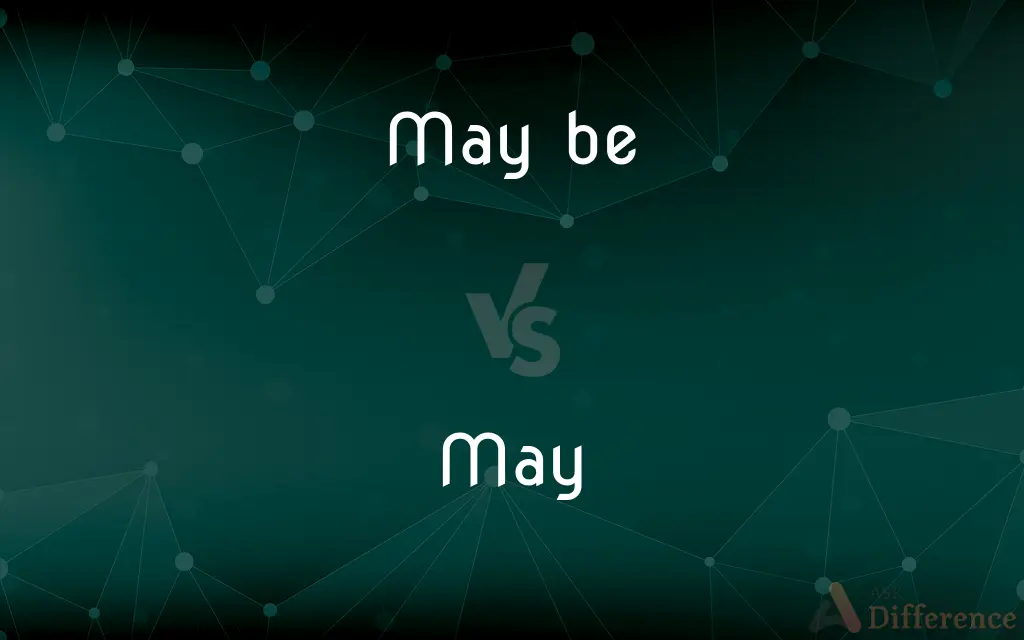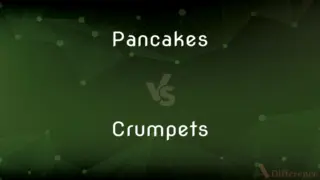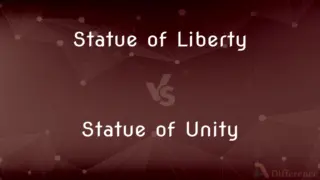May be vs. May — What's the Difference?
By Fiza Rafique & Urooj Arif — Published on February 21, 2024
"May be" is a verb phrase indicating possibility or uncertainty, whereas "may" is a modal verb used to express permission, possibility, or a wish.

Difference Between May be and May
Table of Contents
ADVERTISEMENT
Key Differences
The distinction between "may be" and "may" lies in their grammatical structure and purpose. "May be" combines the modal verb "may" with the verb "be," forming a phrase that suggests something is possible or might be true. For example, "It may be raining outside" conveys uncertainty about the weather.
On the other hand, "may" as a standalone modal verb is used to express permission, possibility, or even a wish. When granting permission, "may" is often used in a formal context, such as "You may leave early today." To indicate possibility, "may" suggests that something could happen, as in "I may go to the party." As an expression of a wish, "may" is used in a more poetic or formal sense, like in "May you have a long and happy life."
The choice between "may be" and "may" depends on the intended meaning. When aiming to convey the possibility of a particular state or condition, "may be" is appropriate. In contrast, "may" is used when granting permission, expressing potential actions or events, or making a formal wish.
Comparison Chart
Function
Indicates possibility or uncertainty about a state or condition
Expresses permission, possibility, or a wish
Structure
Verb phrase (modal verb + verb)
Modal verb
ADVERTISEMENT
Usage Example
"She may be the winner of the contest."
"You may start your presentation now."
Context
Used to suggest that something is possible or might be true
Used to grant permission, suggest potential actions or events, or express a wish
Formality
Generally informal, used in various contexts
Can be formal or informal, depending on the context
Compare with Definitions
May be
Used in speculative statements.
He may be the best candidate for the job.
May
Used to express wishes or hopes.
May your journey be safe and pleasant.
May be
Suggests a possibility or uncertainty.
It may be cold outside, so take a jacket.
May
Serves as a softer alternative to might.
There may be a delay in the schedule.
May be
Can imply doubt or speculation.
She may be arriving late due to traffic.
May
Can introduce a polite request.
May I have a glass of water, please?
May be
Relates to the state or condition of something.
The door may be unlocked.
May
Grants permission in a formal or polite manner.
You may enter the room now.
May be
Often requires additional context.
The solution may be more complex than we thought.
May
Indicates the possibility of an action or event.
I may visit Paris next year.
Common Curiosities
Is "may be" always followed by a noun?
Not necessarily; "may be" is followed by an adjective, noun, or adverb depending on the context, e.g., "She may be late."
How formal is the use of "may"?
"May" can range from formal to informal, depending on its use in granting permission, expressing possibility, or making wishes.
Can "may" and "may be" be used interchangeably?
No, they serve different grammatical functions and convey different meanings.
Can "may" be used to express certainty?
No, "may" expresses possibility, not certainty. For certainty, words like "will" or "shall" are more appropriate.
Is "may be" appropriate in academic writing?
Yes, but it should be used to accurately reflect uncertainty or possibility regarding the information being presented.
How does context influence the choice between "may be" and "may"?
The choice depends on whether the speaker wants to suggest a possibility ("may be") or express permission, potential, or a wish ("may").
How does the use of "may" affect the tone of a request?
Using "may" in a request softens the tone, making it more polite and less direct than using "can" or "could."
How does the use of "may" change in questions?
In questions, "may" often seeks permission or inquires about possibilities, e.g., "May I leave early today?"
Can "may" be used to express wishes in informal contexts?
While "may" in wishes is more common in formal or literary contexts, it can be used informally, especially in set phrases like "May the best team win."
How is "may" used in conditional sentences?
"May" can be used in the result clause of conditional sentences to express possible outcomes, e.g., "If it rains, the picnic may be canceled."
Can "may" be used to express future actions?
Yes, "may" can indicate that something is likely to happen in the future, e.g., "We may travel to Japan next year."
Is "may" used in legal documents?
Yes, "may" is often used in legal documents to indicate that something is permitted but not obligatory.
Can "may" be used in negative sentences?
Yes, "may" can be used in negative constructions to deny permission or indicate that something is unlikely, e.g., "You may not use my laptop."
What are common mistakes when using "may be" and "may"?
A common mistake is confusing "may be" with "maybe" or using "may" when certainty is intended, which requires "will" or "must."
Can "may" imply a degree of politeness in requests?
Yes, using "may" in requests adds a level of politeness or formality, e.g., "May I ask a question?"
Is "may be" considered passive voice?
"May be" isn't inherently passive; it indicates possibility. Passive voice involves the subject being acted upon, e.g., "The book may be read by many."
Does the use of "may" in a sentence always create ambiguity?
While "may" introduces possibility, context often clarifies the degree of likelihood or intent, reducing ambiguity.
Is "may be" always two words?
Yes, in the context of expressing possibility, "may be" is always two separate words. "Maybe" as one word is an adverb meaning "perhaps."
What is the past tense form of "may"?
"May" doesn't have a traditional past tense form but "might" is often used to express past permission or possibility, e.g., "He said I might go."
How does "may" interact with other modal verbs in a sentence?
"May" can be used with other modals in conditional sentences or polite requests, e.g., "You might want to check if you may enter."
Share Your Discovery

Previous Comparison
Pancakes vs. Crumpets
Next Comparison
Statue of Liberty vs. Statue of UnityAuthor Spotlight
Written by
Fiza RafiqueFiza Rafique is a skilled content writer at AskDifference.com, where she meticulously refines and enhances written pieces. Drawing from her vast editorial expertise, Fiza ensures clarity, accuracy, and precision in every article. Passionate about language, she continually seeks to elevate the quality of content for readers worldwide.
Co-written by
Urooj ArifUrooj is a skilled content writer at Ask Difference, known for her exceptional ability to simplify complex topics into engaging and informative content. With a passion for research and a flair for clear, concise writing, she consistently delivers articles that resonate with our diverse audience.













































